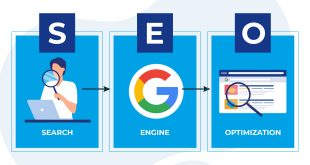Search Engine Optimization (SEO) is the foundation of digital marketing, vital for businesses looking to increase their visibility on the Internet and drive natural traffic to their sites. In this post, we’ll explore the complexities of SEO and its functionality, importance, and perfect methods.

Introduction to SEO:
SEO refers to various techniques and strategies developed to improve a website’s appearance on search engines’ results pages. Payoff webpages (SERPs). It is the process of optimizing different elements of a website to raise its position within natural search outcomes.
Importance of SEO in Digital Marketing:
In today’s interactive online environment, searching for the outcome is essential for companies to get their message across to the right audience on the first outcome page. Effective SEO not only improves site traffic but also improves brand recognition and creates leads.
How Search Engines Work:
I am learning how search engines work, which is crucial to understanding the core of SEO.
Crawling:
Google crawlers, led bots, or spiders can search the Internet Internet for material. They follow links between pages, collecting information about every page.
Indexing:
When a website is crawled, its material is indexable, which means it is added to a search engine’s database. Indexing allows search engines to find relevant pages whenever users type in inquiries.
Ranking:
Search engines rank indexed websites according to various aspects, including authority, relevance, and user experience. Websites that meet these requirements are ranked higher in search results.
Key Elements of SEO:
A number of key factors contribute to SEO’s effectiveness, and several key elements are essential to its success.
Keywords:
Keywords are the words or phrases people enter into search engines to find information. Incorporating keywords relevant to your website material can help increase its search payoff.
Content:
High-quality, informative material is vital to SEO success. Engaging material that caters to users’ needs and interests can significantly impact search engine ranking.
Backlinks:
Inbound or backlinks are hyperlinks from other websites that direct visitors to your website. Creating a variety of high-quality backlinks increases the authority and credibility of your site to search engines.
On-page Optimization:
On-page optimization is about optimizing specific websites to raise their search engine rankings. This involves optimizing meta tags and headings, as well as alt text for images.
Off-page Optimization:
Off-page optimization refers to actions carried out outside your website to boost its rankings on search engines. This includes linking, social media engagement, and managing online reputation.
Types of SEO:
SEO is broadly divided into three major categories.
On-page SEO:
On-page SEO concentrates on optimizing the individual pages of a website to improve its ranking and generate more targeted traffic. This involves improving content metadata tags, meta tags, and URL structure.
Off-page SEO:
Off-page SEO is the process of performing activities in addition to your website’s content to increase its search engine ranking. This can include building backlinks, engaging with social media, and reaching out to influencers.
Technical SEO:
Technical SEO improves all website technical elements to boost the search engine’s visibility. This is a matter of speed and mobile-friendly structure.
SEO Tools and Resources:
An abundance of resources and tools are accessible to assist in SEO efforts.
Keyword Research Tools:
Tools such as Google Keyword Planner, SEMrush, and Moz Keyword Explorer help identify relevant keywords and analyze their search volume and competition.
Analytics Tools:
Platforms such as Google Analytics and Google Search Console prepare important insight into website performance, including the sources of traffic, user behavior and ra, and rankings for keywords.
SEO Plugins:
Plugins such as Yoast SEO, which are compatible with WordPress, provide user-friendly solutions to optimize on-page SEO elements such as headings, meta tags, and XML sitemaps.
SEO Best Practices:
Following SEO-desirable techniques is vital to achieving lasting outcomes.
Quality Content Creation:
Producing quality, relevant material that meets users’ needs is crucial to SEO success. Content should be informative, entertaining, and optimized for targeted keywords.
Mobile Optimization:
With an increasing number of users accessing the Internet through smartphones, optimizing sites for mobile responsiveness is vital to SEO.
Page Speed Optimization:
Speedy-loading websites provide more user-friendly experiences and are highly rated in search results. Optimizing your website’s speed through image compression, caching, and limiting HTTP requests will improve search engine optimization.
User Experience:
Enhancing user experience by creating user-friendly navigation, clear calls to action, and responsive designs improves website usability and increases engagement.
Standard SEO Mistakes to Avoid:
However, despite its importance, SEO is not without risk, and it can also lead to mistakes if it needs to be done correctly.
Keyword Stuffing:
Overloading websites with keywords to influence search engine rankings can result in penalties and decreased rankings.
Duplicate Content:
The publication of duplicate or copied material could harm your site’s credibility and lead to lower search engine rankings.
Ignoring Technical SEO Issues:
Not paying attention to technical issues such as mobile-friendliness, speed, and crawlability could slow down your website’s performance on the search outcome.
The Future of SEO:
As technology develops and the world of SEO changes, so does the world of SEO.
Voice Search Optimization:
With the increasing popularity of devices that can be activated by voice and virtual assistants, optimizing for the ability to search with voice is increasingly crucial for SEO.
Artificial Intelligence in SEO:
The advancements of AI and machine learning are changing the way that search engines comprehend and evaluate content, which is resulting in more customized results.
Conclusion:
In the end, SEO plays a pivotal role in the digital marketing process and helps companies boost their visibility on the Internet, attract organic traffic, and achieve their marketing goals. By understanding the basics of SEO and using desirable methods, companies can remain ahead of the ever-changing digital world.
Read More: Digital Business Trends
 Digital Business Trends Powering Growth With Digital Strategies.
Digital Business Trends Powering Growth With Digital Strategies. 


